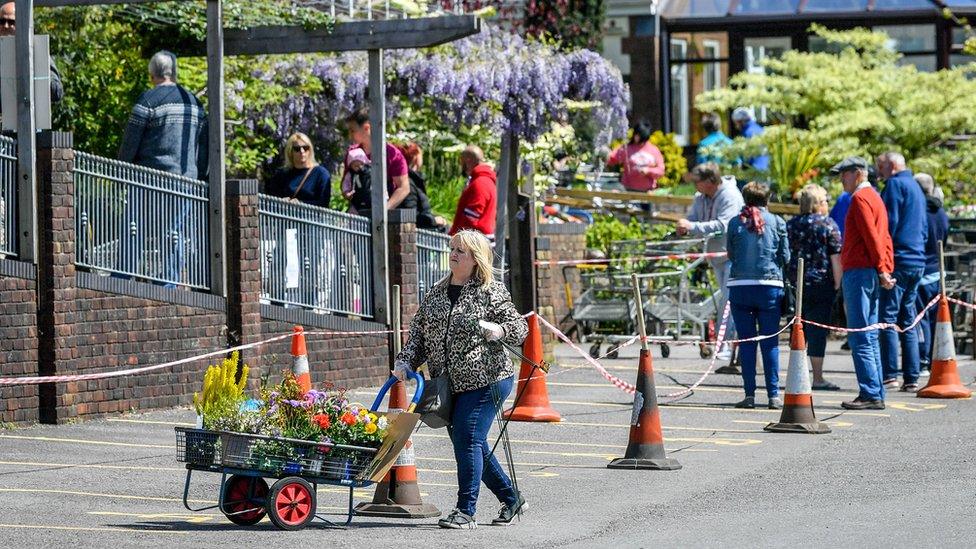Coronavirus: Some return to work as lockdown eases slightly in England
- Published
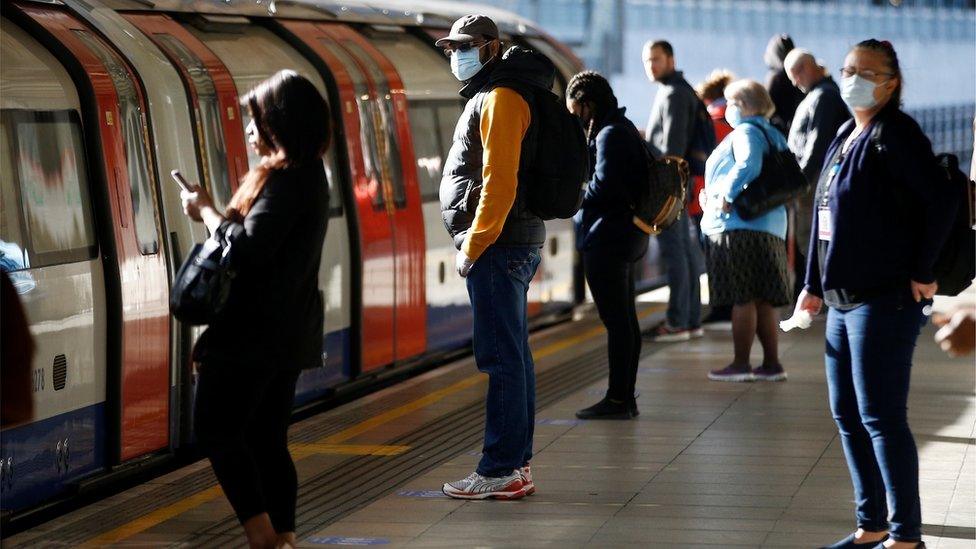
Some passengers at Canning Town underground station in east London wore masks for their commute on Wednesday morning
Some people in England who cannot work from home are returning to their workplaces today, as the government begins easing some lockdown measures.
The government urged people to avoid public transport if possible.
But some commuters said Tube trains and buses were still too busy to observe social distancing rules.
Meanwhile, new guidance issued by the College of Policing, external said officers had "no powers to enforce two-metre distancing" in England.
Under the new rules in England, people can now spend more time outside and move house.
Garden centres can reopen and sports that are physically distanced - such as golf - are now permitted.
Two people from different households can meet in outdoor settings, such as parks, as long as they stay more than 2m apart.
However, government guidance on maintaining a 2m distance, avoiding public transport and wearing face coverings in enclosed spaces is "not enforceable" by officers in England, according to the fresh guidelines from the College of Policing.
It follows a speech by Prime Minister Boris Johnson on Sunday in which he unveiled a "conditional plan" aimed at reopening society.
This has led to a divergence in lockdown rules between the UK government and the devolved administrations, with Scotland, Wales and Northern Ireland keeping stricter measures in place and retaining the message to stay at home.
It comes as figures from the Office for National Statistics showed the UK economy shrank at the fastest pace since the financial crisis in the first quarter of 2020.
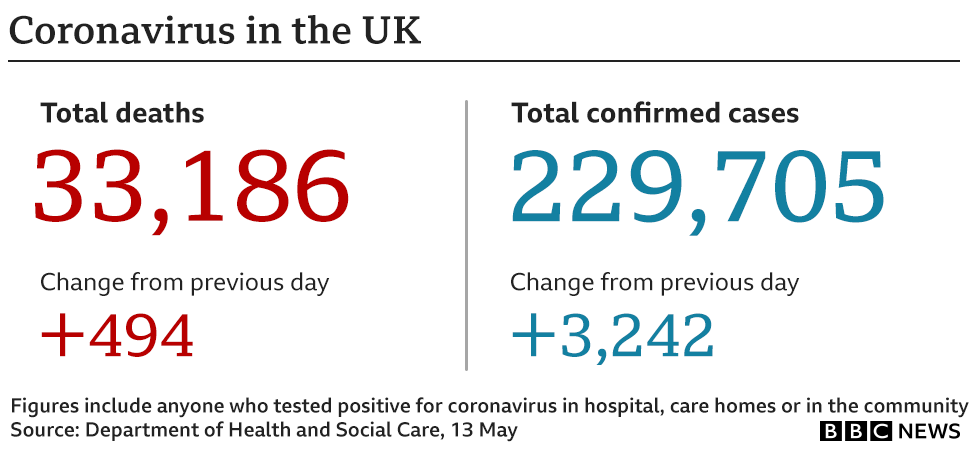

Chancellor Rishi Sunak told the BBC it was "very likely" the UK would face a "significant recession" as a result of the pandemic.
The number of people who have died after testing positive for coronavirus in the UK has reached 33,186,, external a rise of 494 on the previous day.
Housing Secretary Robert Jenrick led the Downing Street daily briefing and was joined by the deputy chief medical officer for England, Dr Jenny Harries.


The lockdown has brought immense challenges for the police service.
Although crime has plummeted and police sickness rates have been far lower than expected, officers have found themselves caught in the middle of a web of hastily-drawn up regulations and guidelines.
The latest police guidance for England suggests their job won't be any easier as it makes clear they can only enforce the law - not government advice.
That means, for example, you can be stopped or fined if you go on an overnight trip or meet up with two or more people from outside your home - because that's the law.
But officers can't prevent you from standing close to a stranger or travelling by train without a face mask on - because two-metre distancing and wearing face coverings in enclosed spaces are guidance.

In England, employers have been issued with guidelines on keeping workplaces as safe as possible, external, including staggering shifts and frequent cleaning.
Those who flout the rules could face criminal proceedings, the Health and Safety Executive watchdog has warned.
Frances O'Grady, general secretary of the Trades Union Congress, said the new guidelines for employers were "a step in the right direction" but "the real test will be delivery".
She said employers should publish a risk assessment and if workers had any concerns they could contact the Health and Safety Executive hotline.
"It's really important to remember that workers do have that right in law not to work if it would put them in imminent danger," she told BBC Breakfast.
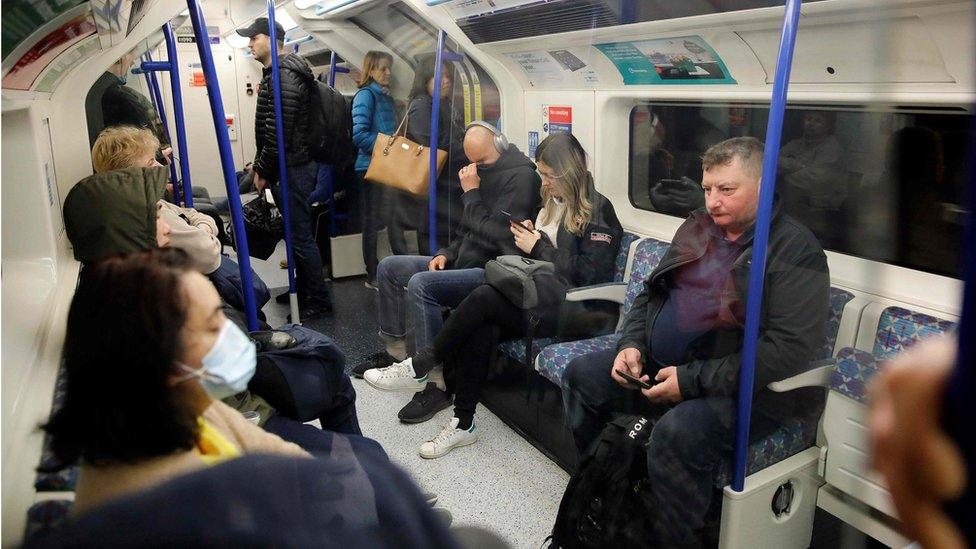
Some commuters were not able to maintain a 2m distance on a Victoria Line Tube into central London
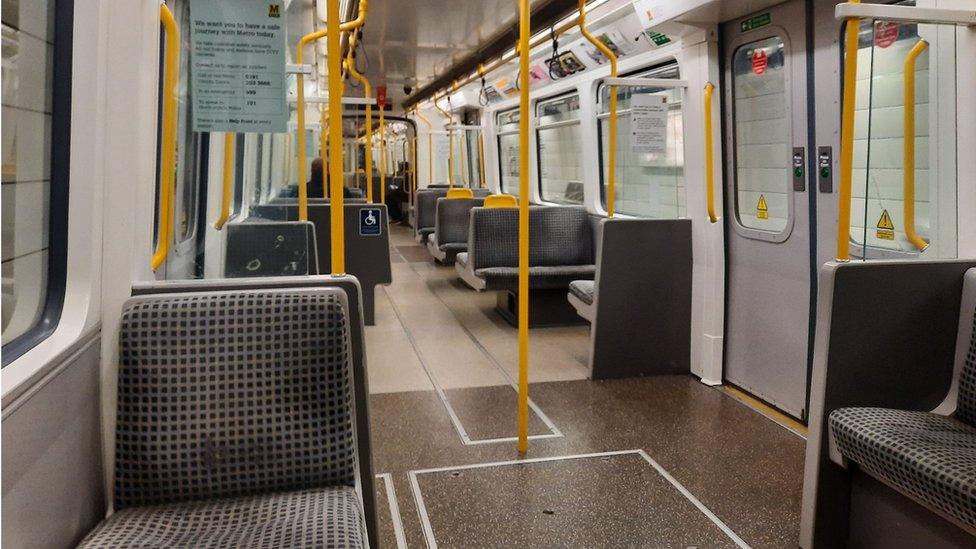
By contrast, one commuter pictured this almost-deserted Tyne and Wear Metro carriage in Newcastle
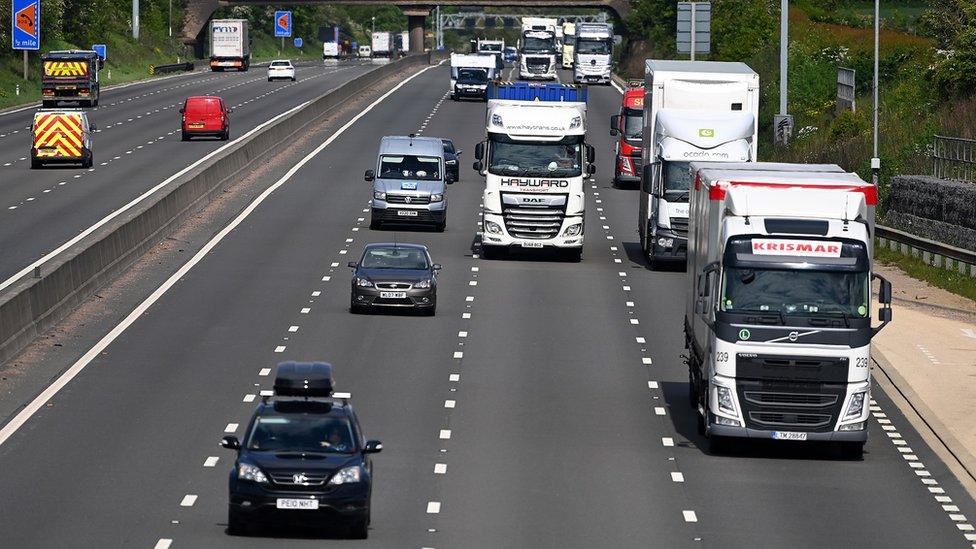
There was some traffic on the M1 in Northamptonshire on Wednesday morning
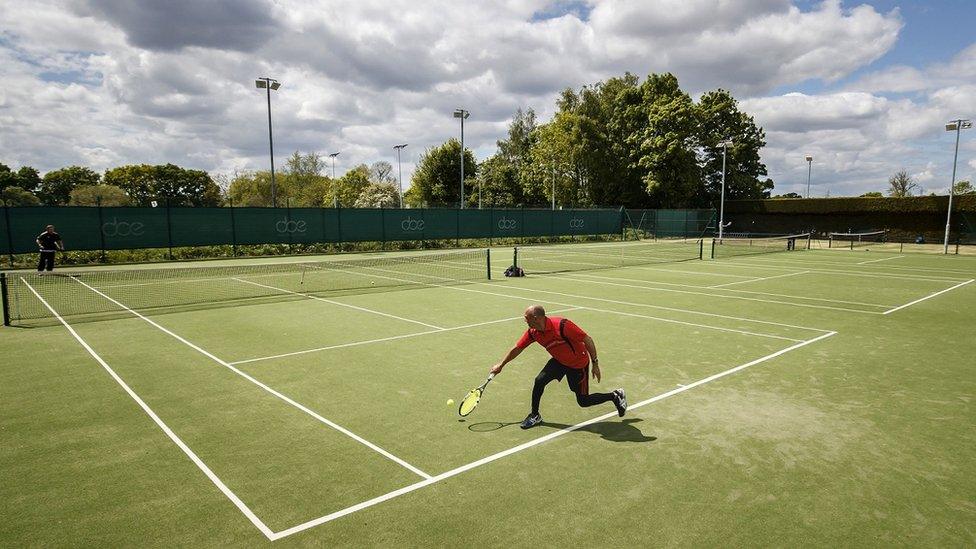
York Tennis Club opened for players on Wednesday after restrictions were eased
Asked how it was possible for people to maintain social distancing on public transport as more people returned to work, Transport Secretary Grant Shapps said the government was urging people to cycle and walk where possible.
"The absolute key here is for anybody who can to make alternative arrangements for travel," he told BBC Breakfast.
He added that, even if the public transport network was running at full capacity, only one in 10 passengers would be able to travel while keeping to social distancing rules.
Passenger numbers across the UK's major railway stations were up 10% up compared with the same day last week, BBC transport correspondent Tom Burridge said.
Transport for London (TfL) said the number of passengers using the Tube from the start of service to 06:00 was up by 8.7% compared with the same period last week. As of 10:00 the number of Tube passengers was about 7.3% higher.
However both figures are still a fraction of the normal numbers and Downing Street said TfL was "not reporting significant increases" on the London network compared to the last few days.
One commuter told the BBC it was "next to impossible" to socially distance on the London Underground and most people were not wearing masks.
In Blackpool, a hospital worker said the downstairs of her bus was "packed" during her morning commute.
Allow X content?
This article contains content provided by X. We ask for your permission before anything is loaded, as they may be using cookies and other technologies. You may want to read X’s cookie policy, external and privacy policy, external before accepting. To view this content choose ‘accept and continue’.
Allow X content?
This article contains content provided by X. We ask for your permission before anything is loaded, as they may be using cookies and other technologies. You may want to read X’s cookie policy, external and privacy policy, external before accepting. To view this content choose ‘accept and continue’.
Asked about reports of busy rush hour trains and buses during Prime Minister's Questions, Mr Johnson said: "I don't want to see crowding on public transport in our capital or anywhere else."
He said the government was "working very actively" with TfL to increase capacity and lay on more Tube trains when necessary.
"We also want to see proper marshalling at stations to prevent crowding of trains," he added.

SCHOOLS: When will children be returning?
EXERCISE: What are the guidelines on getting out?
THE R NUMBER: What it means and why it matters
AIR TRAVELLERS: The new quarantine rules
LOOK-UP TOOL: How many cases in your area?

The updated lockdown regulations, which were presented to Parliament on Tuesday, also allow people to leave their homes to collect goods ordered from businesses or to travel to waste or recycling centres.
Some outdoor sports can get under way again, with golf clubs and tennis courts expected to reopen to the public. Playgrounds, however, will stay shut.
Restrictions have also been lifted on how far people can travel to get to the countryside, national parks and beaches in England.
However, people have been warned to respect local communities, keep their distance from others and avoid busy areas.
The government reiterated that staying overnight at a holiday or second home was not allowed.
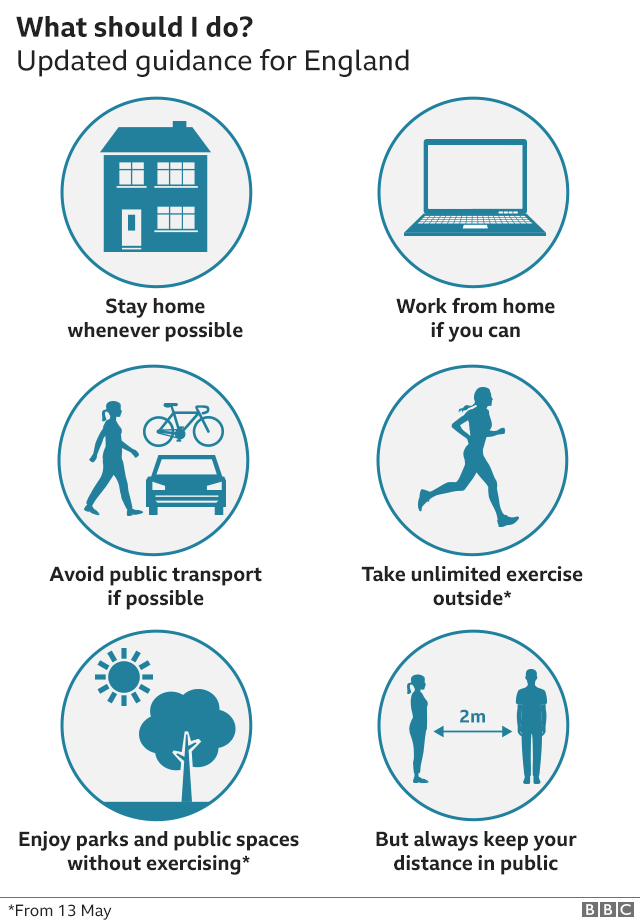

Those who break the rules will now face fines starting at £100 in England, and this will double on each further repeat offence up to £3,200.
National Police Chiefs' Council chairman Martin Hewitt said officers would "continue to use common sense and discretion".
He told BBC Breakfast police would be "encouraging" people to go home if they were not out for a "legitimate reason" and enforcement and fines would be used "only as a last resort".

CORONAVIRUS NEWSCAST: All of the latest updates on the pandemic
MINDFUL MIX: Calming tracks to help you relax
Content available only in the UK

In other developments:
The prime minister has been accused of misleading MPs over advice to care homes at the start of the pandemic on controlling infections
The government again missed its 100,000 daily coronavirus testing target, with 87,063 tests on Tuesday
Millions of self-employed people can now apply for an income support grant of up to £7,500 from the government
Up to 8,000 jobs are at risk at travel firm Tui, as it pledges to "reinvent the holiday in 2020" amid the pandemic
Childminders in England can reopen from Wednesday if they are caring for children all from the same household, the government has announced
Teacher unions have warned that schools do not have adequate safety measures in place to reopen, after the government told them prepare to open for more children from 1 June
Estate agents can also reopen and house viewings can be carried out
The Transport Salaried Staffs Association is urging the government to extend the coronavirus compensation scheme for NHS and care workers who die with coronavirus to transport workers. It comes after ticket officer Belly Mujinga died with the virus after being spat at by a member of public who claimed he had Covid-19
A three-day-old baby died in hospital in Swansea after his mother tested positive for coronavirus, an inquest opening has heard

Are you returning to work today? Tell us about your commute by emailing haveyoursay@bbc.co.uk, external.
Please include a contact number if you are willing to speak to a BBC journalist.
Tweet: @BBC_HaveYourSay, external
Send pictures/video to yourpics@bbc.co.uk, external
Please read our terms & conditions and privacy policy
- Published1 July 2022

- Published12 January 2021
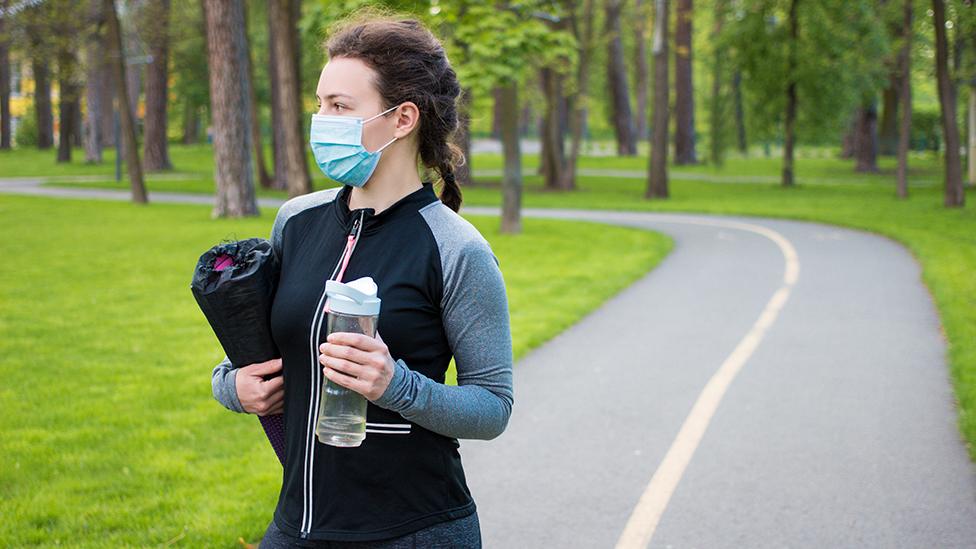
- Published13 May 2020
